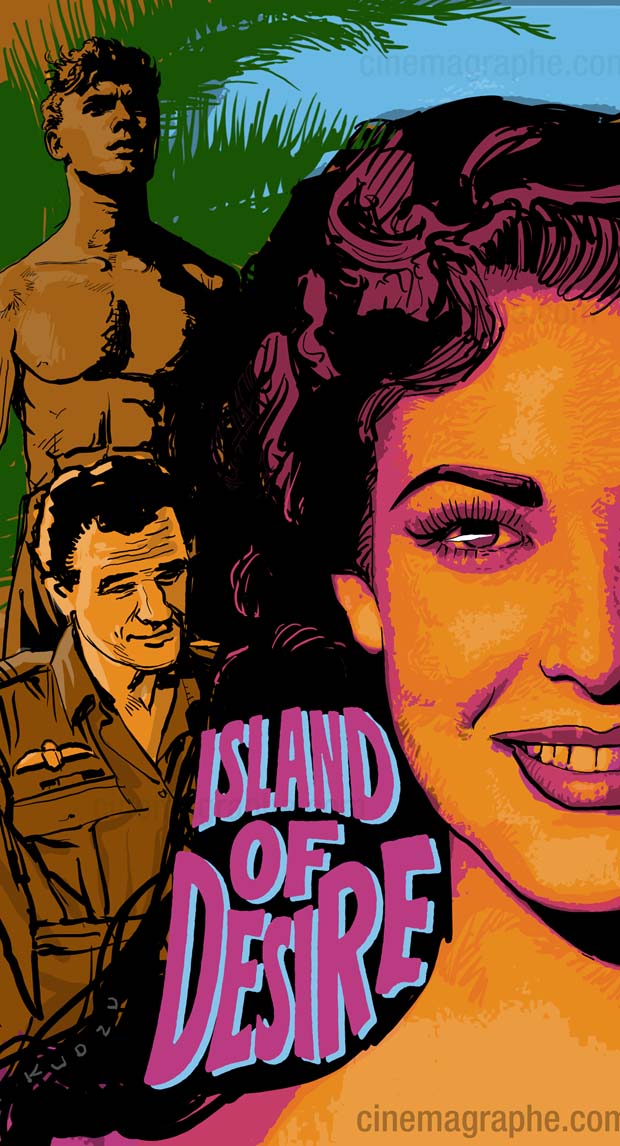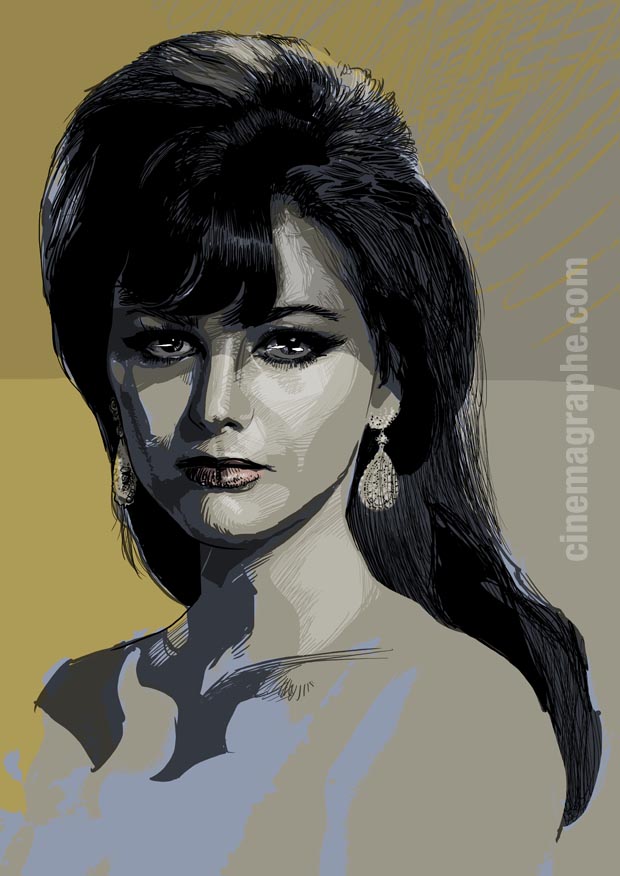Reviews of Classic Film, with artwork and news
LAST UPDATE November 25, 2025

Fast Reviews:
Island of Desire – 1951: A flawed movie with very nice color photography and an occasional witty moment from the script:
Linda Darnell: Dugan, I really wanted to help, but I was terrified. You've never been afraid, have you?
Tab Hunter: Sister, the only thing that scares the tar out of me is you.
Mild ironic statements aside, Island of Desire (titled Saturday Island in the UK release) is a melodrama about the problem of two people trapped together on a deserted island. It's a tale that's been explored in a whole sub-genre of Hollywood movies, chiefly built around the original 1949 and subsequent remakes of The Blue Lagoon. There are variations on the theme like the 1957 Heaven Knows, Mr. Allison, and an inversion of that with Hell in the Pacific (1968), and, well, this motion picture itself.
Tab Hunter plays a U.S. marine and Linda Darnell a highly-skilled veteran combat nurse aboard a busy hospital ship during World War II. The ship strikes a mine and goes up in flames, Tab cuts loose a life raft and gets aboard it, calling out for any other survivors amid the wreckage, and Linda is the only one to respond. They drift aimlessly on the ocean and eventually come to an island abandoned by the native population (and why they did so is a slender little sub-story that gets some marginal attention as the movie unreels).
Tab's character is elated with the gorgeous island, Darnell's less so, particularly after they find a wrecked sail boat (Tab yells out "Hey, White Guy's stuff!" when he spots it wedged into the rocks on the island shore). They pore through the boat's contents and discover the owner's skeleton on a bunk, a bullet through his head, and all the material on board seems to date to 1930:
Linda: It makes me realize, I'm stuck here. There won't be any planes or ships. We'll never be found. Will we!
Tab: We might be.
Linda: Did he shoot himself because the traffic was so heavy?
Tab: I don't know yet. I sure don't get it. It's a terrific island: it's got everything.
Linda: Oh, of course, a regular paradise! He had everything a man could possible want. Not a care in the world. Free groceries, no rent, no taxes, no wars. Nothing.
Though featuring an A-list star (Linda Darnell), costly Technicolor photography, and though this tale is told in an effective way at times, Island of Desire has an amateurish quality that keeps cropping up. Special effect sequences (bad weather, some of the stunt work) is edited so tightly that it seems like in a few places there simply isn't any footage to explain what's happening on screen except in a very fleeting way.
Perhaps the most annoying aspect of this "A" film is that in the first third of the tale the music comes crashing into the story like the sound track of a 1930's movie serial where every action and mood has to be enunciated by an overactive orchestra pounding away. There is also that this is one of Tab Hunter's first film roles and this shows up in many of his scenes. Once the pair of actors are isolated onto the island, the pacing finally settles into telling the tale and calmly moving forward and Hunter's acting chops seem to improve right along with the story. Though the pair have been bickering and arguing the whole time since they'd met, they begin to, shall we say, bond. It is a tortuous process for Tab Hunter's character and he commences to doing a "you're tearing me apart!" style of naturalistic expression that predates James Dean and the whole wave of 1950's method acting, though a less charitable view of this would be to say Hunter can't control his stylization and is expressing emotional repression as a form of clenched and hunched physical impactation.
The script makes sure we understand there is an "unsaid" tension between the two. Tab Hunter's young man, formerly so overjoyed with the island that he was convinced is a paradise, has now become miserable, telling the nurse "You got me talking to myself, you don't want to know what I think about, or how I feel!" The issue between them in Hollywood terms is sex, but in the script it is that there is a huge but not clearly defined age difference between the two. The cinematic problem (which is unintentionally hilarious at times) is that Tab Hunter looks all of the 19 years old he literally was during the filming, and Linda Darnell's character may say she's "an old maid, only fit to be ignored" in the dialogue, but we're watching documentary proof simultaneously that Darnell is at best only the actual 27 years of age she was when she made this movie, and on top of that, well, she looks like Linda Darnell.
The implausibilities mount when a British fighter plane pilot (Donald Grey) crash lands on the island, and, injured badly, has to have his arm amputated. This is easy enough for the experienced nurse, and the pilot recuperates quickly. But, now we've got three people on the island and two of them have overwhelming infatuations for Linda Darnell. It will take the British navy to solve this problem (they arrive just in time!)
The South Pacific location is beautiful though really a facsimile: we're looking at Jamaican palms and beaches. Tab Hunter climbs up and down rocks and palms and the huts that he builds like an energetic teenager, and Darnell weaves clothing from palm fronds that somehow become a rather elaborate wardrobe as the minutes roll by.
Donald Gray doesn't pretend to be missing an arm, and there's no special effects here, though the director (Stuart Heisler) usually tries to hide the wound from direct visual inspection. Gray actually lost his left arm to the Germans while fighting in Europe in 1944, something which brings up an odd situation in the film: he can still outfight Tab Hunter's marine in a third act tussle over Darnell.
Darnell performs fine, and Tab Hunter is not exactly refined in Island of Desire, but if you are in the mood to cut the film some slack, something that comes in handy for the sizeable catalogue of films that are somehow over-polished and under-polished at the same time, Island of Desire has it's moments. The photography is very good and the island looks gorgeous.
Fast Reviews:
Road to Morocco – 1942: The "Road" movies featuring Bob Hope, Dorothy Lamour and Bing Crosby all share certain elements, particularly a loose and relaxed way in which the humor is allowed to dominate the plot, and probably the most extreme of this is Road to Morocco, often considered the best of the seven 'Road' movies (it seems to battle for first place with Road to Utopia for the 'best of" category).
In Road to Morocco, stranded in North Africa after accidentally sinking the ship they're travelling on, Orville (Hope) and Jeff (Crosby) are desperate to raise funds in order to eat, and fast-talking Jeff promptly sells Orville at the slave market. Orville is then placed at the palace of local Princess Shalmar (Dorothy Lamour) and is promoted to being the "temporary" husband-to-be for the princess, which, unknown to Orville, is a position meant to protect her actual love interest Mullay Kasim (Anthony Quinn). It seems that her royal astrologer has predicted her first husband will be dead within weeks of marrying, therefore Orville is meant to be sacrificed as "#1" and then the "real" marriage of Kasim and the Princess can take place. However, when Jeff learns that Orville is at the palace and is due to marry the princess and completely ignorant of the astrology predictions, he is determined to horn in on the arrangement.
All of the Road pictures have a certain informal style to them, and Morocco lets that go wild with regular "fourth wall" remarks made by the actors directly at the audience, inside-jokes about the studio they're working for (Paramount) and frequent one liners. These tossed-off remarks humorously editorialize on the film itself, 1940s politics, the genre of romantic-exotic adventure films, and of course remarks by the cast about the cast.
Dona Drake is on the screen as the Princess's chief palace handmaiden, and Anthony Quinn turns in a perfectly consistent effort at being the menace that keeps Orville and Jeff scrambling and conniving to stay alive, chiefly by employing a great deal of physical comedy and double-talk. Though Quinn's character starts off the film as the only romantic interest Princess Shalmar has eyes for, this changes as Bing Crosby begins to croon through the soundtrack with songs all written by Jimmy Van Heusen and Johnny Burke: Moonlight Becomes You, Constantly, Ain't Got a Dime to My Name, and We're Off on the Road to Morocco.
Including the audience in a film by talking to them directly can sometimes come across as pleading for a little sympathy for the film production or just experimenting in a way to fake-out film critics with some post-modernist magic, but in Road to Morocco it is an exercise of confidence. There were already two previous very successful Road movies, and the three actors here (Lamour, Crosby and Hope) were immensely popular, and the script and songs for the film are first-rate. In a way, watching Bob Hope address the popcorn eaters as intimates is a bit like a championship football team spiking the ball in the end zone.
Fast Reviews:
Actors and Sin – 1952: This mini-anthology diptych written, directed and produced by Ben Hecht is about the business-end of the acting and the producing arts, two tales split in opposite extremes, each like the ancient "Thalia and Melpomene" masks of drama in which one is laughing and the other is crying, somethign that pictures the two stories Hecht has put together here. "a lovely piece of old-fashioned mummery."
More about Actors and Sin, 1952
Criterion classic film releases just ahead
1930 Hell's Angels with Jean Harlow - 4K release – Criterion Coming November 18
1940 His Girl Friday in 4K with Rosiland Russell and Cary Grant – Criterion Coming December 2
4K Captain Blood with Erroll Flynn – Criterion Coming January 20, 2026
The "living Caryatid" Irene Papas
The "living Caryatid" Irene Papas film retrospective at the Greek Film Archive in Athens
Story at Lifo [in Greek - English vis Google Translate]
Fast Reviews:
Ladies Man – 1931: Early "talkie" with a primitive handling of audio and especially the pacing of dialogue but Carol Lombard, kay Francis and a youngish William Powell make it work toward the tragic ending. More about Ladies Man, 1931
Fast Reviews:
Funny Girl – 1968: This film is half of a very, very good musical about early 20th century songstress and comedienne Fanny Brice with Omar Sharif and Barbra Striesand – more about Funny Girl.

Claudia Cardinale has died - 1938–2025
"Acclaimed Italian actor Claudia Cardinale, who starred in some of the most celebrated European films of the 1960s and 1970s, has died, AFP reported Tuesday. She was 87." – Associated Press - New York Post
"Claudia Cardinale, star of ‘8½’ and ‘The Leopard,’ dies at 87" – MSN CNN News
"The rebellious diva of Italian cinema" – La Repubblica [Italian]
From her first film Big Deal on Madonna Street by Mario Monicelli to her latest works with young directors, Claudia Cardinale made more than 150 films. Thus, ‘the girl who didn’t want to go into cinema’ became an icon of Italian identity thanks to collaborations with the greatest Italian directors, from Visconti to Fellini, from Comencini to Ferreri, from Leone to Blake Edwards. She also worked for Hollywood, though she fled from it. The list of awards is long as well: from the David di Donatello prizes for Girl with a Suitcase by Valerio Zurlini and The Day of the Owl by Damiano Damiani to the Silver Ribbons, from the Golden Bear for Lifetime Achievement at the Berlin Festival in 2002 to the Golden Lion for Lifetime Achievement at the Venice Festival in 1993..."
"A symbol of Mediterranean beauty and a beloved actress for directors such as Visconti, Fellini, Leone, and Herzog" – La Stampa [Italian]
Fast Review
There's Always A Woman - 1938: Melvyn Douglas and Joan Blondell are a husband-wife team working from opposite sides on a murder mystery - More about There's Always A Woman

Robert Redford has died - 1936–2025
"Elusive legend of the big screen" – UK The Times
When the success of Butch Cassidy and the Sundance Kid elevated him from promising leading man to bona fide movie star status, Robert Redford did not celebrate. Rather, he sat down and wrote a list of the three key danger points of his newly minted celebrity.... It was a curiously wary response from an actor who had spent the film shoot terrifying the rest of the cast and crew by insisting that he did his own stunts ... Physically daring but intellectually cautious, he was deeply suspicious of Hollywood and its trappings, by nature distrustful of movie industry exuberance. He was — crucially — a very private person, who kept even his closest collaborators at arm’s length. The screenwriter William Goldman recalled that even on their third film together, All the President’s Men, Redford was still too cagey to give out his home phone number."
A movie star and founder of Sundance – Washington Post
Mr. Redford remained essentially a loner who craved the solitude of his wilderness home in Utah and pushed 120 mph on the open highway in his Porsche..."
Virginia USA based Elder Care for bill payment, case management, prescriptions, tax records or support for caregivers - AllStar Care Solutions
Belief-Code, Body Code and T3 Therapy? See sacred-connection.com

